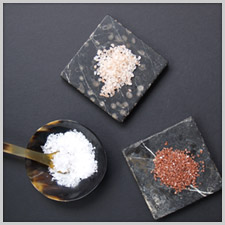Heart & Stroke Health Check™ nutrient standards for sodium
Heart&Stroke Health Check™ is a food information program with nutrient standards based on Canada's Food Guide. The Health Check symbol can help you choose foods in grocery stores and restaurants that can be part of a healthy diet. Each food product and restaurant dish in the Health Check program is evaluated by the Heart and Stroke Foundation's registered dietitians on the basis of fat, sodium, fibre and sugar as well as protein, vitamins and minerals, depending on the item. All participating food manufacturers and restaurateurs must meet these nutrient standards in order to display the Heart&Stroke Health Check symbol. Here are the nutrient standards for sodium.
Sodim (salt)
Whenever health experts refer to salt, what they are really talking about is sodium; sodium is a major component of salt.
We need a certain amount of sodium to help balance fluids and electrolytes in our bodies, but most of us consume two to three times the recommended amount. Why? Well, experts believe that most of the sodium we consume comes from the prepared foods we eat and not the salt we sprinkle on our foods at the table (which accounts for only 10% of total salt intake). Sodium is added to the packaged food by the manufacturers to make foods taste better, and, over time, we've become used to it. When we eat foods with little or no sodium, we may think it lacks flavour.

Salt from around the world: Cyprus Flame, Bolivian Rose and Hawaiian Red
Most of the foods we eat contain some sodium, but many fast foods, prepared meals, processed meats (such as hot dogs and luncheon meats), canned soups, bottled dressings, bouillon cubes, and condiments (ketchup, mustard, pickles) usually contain the highest amount of sodium, contributing most of the sodium in our diets. "Restaurant foods can also be very high in sodium," says Carol Dombrow, Health Check's dietitian.
And that excess sodium can have grave consequences. Three in 10 Canadians have been diagnosed with high blood pressure caused by eating too much sodium. And while everyone can benefit from less sodium, certain people – about one-third of Canadians – are particularly sensitive to the blood-pressure-elevating effects of sodium. For these people, excessive sodium increases the amount of blood in arteries, raising blood pressure and putting them at risk for heart disease and stroke.
Heart&Stroke Health Check nutrient standards for sodium
Cutting back on salt is a heart-smart strategy. The Heart and Stroke Foundation recommends we set a target of 2,300 mg per day, which is the equivalent of 1 teaspoon of salt. That can add up pretty quickly.
That's why Heart&Stroke Health Check is working with food manufacturers to cut the sodium, with a goal of reducing the sodium content of many prepared foods over the next few years.
Health Check dietitians have always actively worked to reduce sodium in products since the program began. In one product line, in the past year alone, they helped remove 10,000 kilograms of sodium from several foods. Heart&Stroke Health Check is committed to helping Canadians cut their sodium consumption. We're working with the health professional community and the food industry to make sure that substantive changes in sodium levels happen as quickly as possible. Heart&Stroke Health Check is the only program in Canada that is publicly credited by senior health experts to be improving the nutrition profiles of commercial foods, and moving sodium levels in the right direction.
Still, Dombrow suggests reading labels and checking the Nutrition Facts table carefully and selecting products with less sodium. Heart&Stroke Health Check can help. The Health Check symbol indicates the following sodium standards have been met.
| Food Product | Current Health Check criteria | New criteria effective Nov. 2010 |
|---|---|---|
| Breads | 480 mg or less | 360 mg or less |
| Cereals | 480 mg or less | 240 mg or less |
| Vegetables | 480 mg or less | 240 mg or less |
| Canned tomato and vegetable juices and blends | 650 mg or less | 480 mg or less |
| Milk | 480 mg or less | 240 mg or less |
| Yogurt | 480 mg or less | 140 mg or less |
| Cheese and cheese products | 480 mg or less | 240 mg or less |
| Meats (including packaged deli meats, ground meat, canned meat, meatballs, sausages, burgers) | 480 mg or less | 360 mg or less |
| Snack foods Bars Dips | 480 mg or less per 50g 480 mg 480 mg or less per 50 g | 360 mg or less per 50 g 140 mg or less 240 mg or less per 50 g |
| Canned Sounds | 650 mg or less | 480 mg or less |
| Dinner Entres or mixed dishes | 960 mg or less | 720 mg or less(effection Dec. 2009) |

